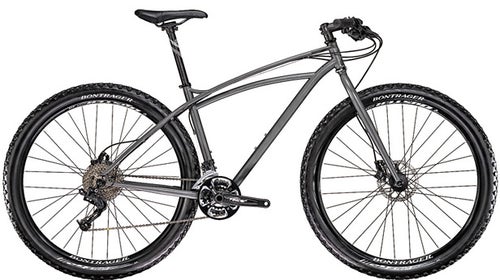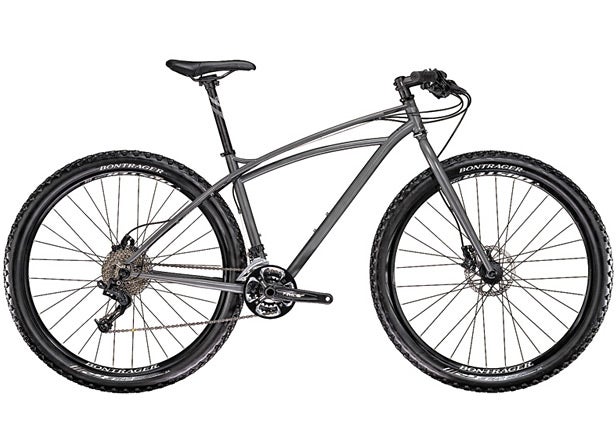Trek Fisher Collection Sawyer
$1,500
THE SELL: The appeal of a cruiser with the quick handling of a rigid 29er.
THE TEST: Every reviewer who pooh-poohed its urbane looks changed his tune after riding it. “I had no trouble keeping up with the pack of full-suspension bikes” was a common refrain. Credit the G2 geometry, which offsets the front fork for deft handling in tight singletrack while preserving the long wheelbase for stability at speed. The funky bends of the Crivitz handlebars were so easy on the wrists that several riders wanted them for their own bikes. Smart: horizontal dropouts allow you to convert it to a single-speed, and its split-frame design can accommodate a quieter (and easier-to-maintain) belt drive.
THE VERDICT: Versatile and agile bike at a great price. 28.7 lbs;
CLIMBING: 3.9 (out of 5)
DESCENDING: 3.6
Scott Scale 29 Pro
$2,500
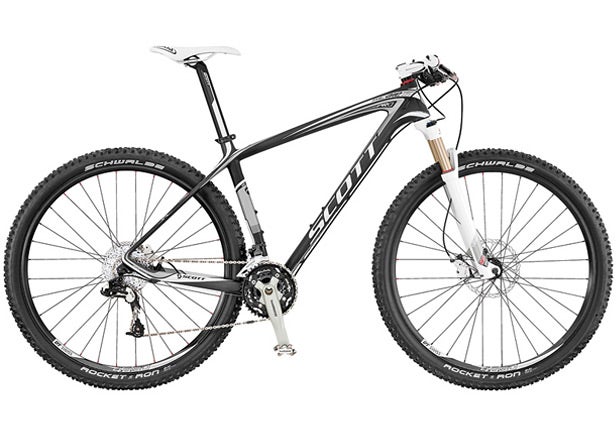
THE SELL: Ultralight hardtail for amateur and aspiring racers.
THE TEST: A few years ago, a sub-1,000-gram road frame was revolutionary. So the fact that a 29er now checks in at just 949 grams is a wonder. Credit Scott’s precision shaping technology, which adds stiffness in the wide top tube and beefy bottom bracket but flattens the tubing for vertical flex, taking the sting out of the trail. “It flies without beating you to a pulp like most hardtails,” one tester said. Nice touch: you can (conveniently) lock out the Reba 29 RL front fork with a handlebar-mounted lever.
THE VERDICT: “Killer deal! I’ve paid as much for bare frames this good,” one tester raved. 24.1 lbs;
CLIMBING: 4.1
DESCENDING: 3.7
GT Force 2.0
$2,650
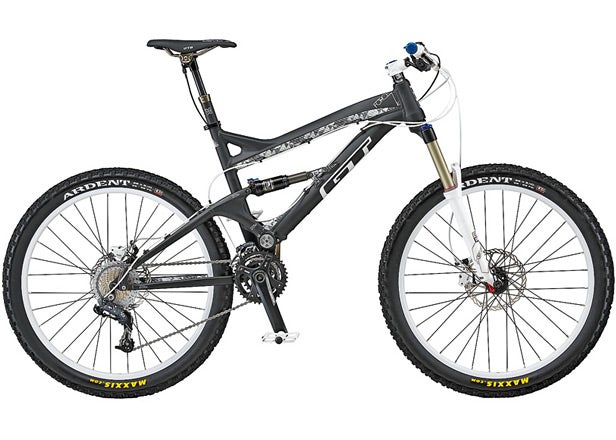
THE SELL: Durable rig that loves going down.
THE TEST: The slack head-tube angle and Rockshox Sektor Solo Air through-axle fork made a six-foot drop feel like going off a simple curb, while the chunky hydro-formed aluminum frame and burly pivots didn’t so much as wince after weeks of bombing technical downhills. We’ve always liked GT’s Independent DrivetrainÔÇöit isolates the bottom bracket from both rear triangles for travel that’s virtually immune to pedal feedbackÔÇöand it’s as efficient as ever for a six-inch all-mountain ride. Even the workmanlike SRAM X7 components felt right: “Tough but not a fortune to replace when you crash,” as one tester put it.
THE VERDICT: Time to get a full-face helmet and body armor. 31.4 lbs;
CLIMBING: 3.3
DESCENDING: 4.4
More mountain-bike companies are switching to through-axle front-ends, which use a thicker, hollow hub axle that screws into the fork for increased rigidity and steering accuracy.
Niner Jet 9
$4,475 (as tested)
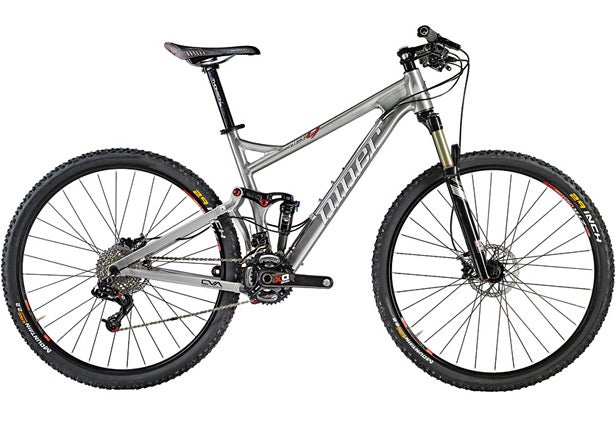
THE SELL: Full-suspension 29er meets race-ready performance.
THE TEST: With short travel (just three inches) and feathery wheels, speed is the name of the game for this aluminum rocket. The Jet 9 handled better than most of the 26ers we tested but never felt twitchy. Several riders commented on the bike’s instant accelerations, but what surprised us most was how well it handled steep, technical downhills. A big reason why is that Niner has really figured out the geometry and suspension. The price gets you quality bits and piecesÔÇöour test bike had full Shimano XT and a Thompson stem and postÔÇöbut for the money we wish the Jet 9 were a pound or two lighter.
THE VERDICT: If it lost a little weight, it’d be damn near perfect. 26.8 lbs;
CLIMBING: 3.8
DESCENDING: 4.2
Wheels are the linchpin of a great 29er, and our Jet 9 came with the best hoops for the priceÔÇöwith satiny DT Swiss hubs, Stan’s 355 rims, and supple Continental Race King tires.
Giant Anthem X 29er II
$2,900
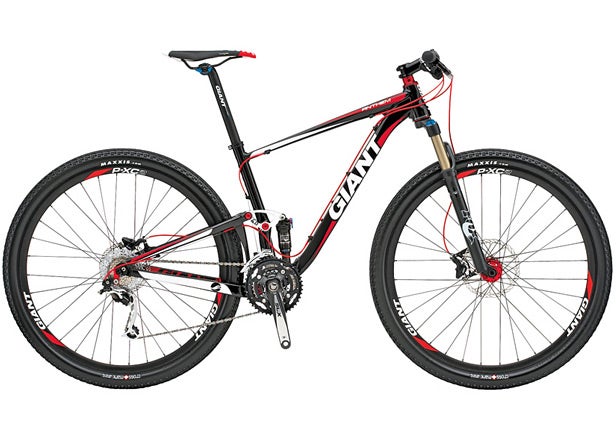
THE SELL: A big-wheeled, go-anywhere full-suspension rig.
THE TEST: This four-inch 29er felt capable almost everywhere we pedaled. It plowed down rocky slopes, traced silky arcs in flowing singletrack, and didn’t hesitate (much) on punchy climbs. That faint hesitation wasn’t from the suspensionÔÇöthe rear wheel stayed glued down and grinding, even on rubbly uphillsÔÇöbut because of the house-branded rims, which felt plenty stiff but a bit sluggish. Shimano’s SLX drivetrain might be budget-minded, but it impressed with its speedy shifting and stable performance. Testers loved all the anodized red bits, which add bling without being obnoxious, but were less thrilled with the rear-shock-adjusting ProPedal switch, which is low and hard to reach.
THE VERDICT: Big-wheeled fun at a manageable price. 27.1 lbs;
CLIMBING: 3.6
DESCENDING: 4.1
Jamis Dakar 650 B2
$5,000
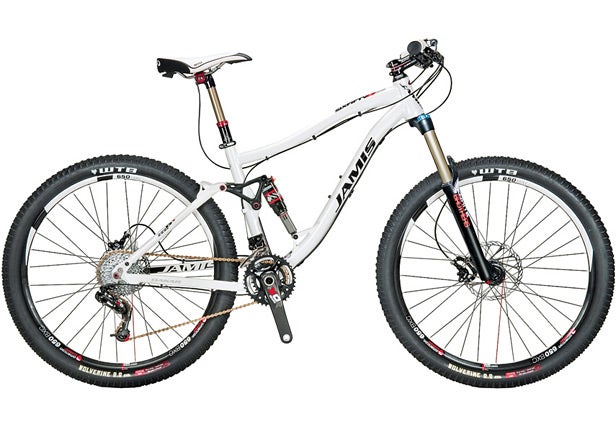
THE SELL: An in-between wheel size rides best.
THE TEST: Jamis has joined the small but burgeoning chorus that believes the 650B wheel sizeÔÇöbased on an old French standard, and the equivalent of a 27.5-inch tireÔÇöis ideal, blending the sprightly handling of a 26-inch wheel with the rolling advantages and comfort of a full-suspension (five inches of travel) 29er. As much as we hate to further fuel the wheel wars, we concede they might be right. “The best balance I’ve felt on a bike,” said one tester. Part of the credit goes to Jamis’s even geometry and the White Brothers Loop 130 TCR fork (one of the few options available for 650B-size wheels), which bulldozed steep gulches overflowing with river rocks as if they were covered with gravel.
THE VERDICT: 650s are here to stay. 28.4 lbs;
CLIMBING: 4
DESCENDING: 4.3
Felt Edict Pro
$5,500

THE SELL: One of the lightest full-suspension bikes around.
THE TEST: Our testers praised the simple, single-pivot rear-suspension design, which gets its four inches of travel from flex in the chainstays, on this flyweight carbon-fiber frame. Even better, the Fox RP23 shock’s three-position ProPedal afforded excellent traction on the ups and a surprisingly plush ride on the way down. “Climbs like a billy goat, descends like a zip line,” wrote one tester. The full XT component package shifted and braked flawlesslyÔÇöand will for years to come. One slight waver: several testers found the Edict’s front end too fast. “Twitchy!” wrote one. “Squirrelly,” said another. Wider handlebars would help, as would a longer stem.
THE VERDICT: Wicked fast, but might be too jittery for some. 23.5 lbs;
CLIMBING: 4
DESCENDING: 4
Ibis Mojo HD
$5,600 (as tested)
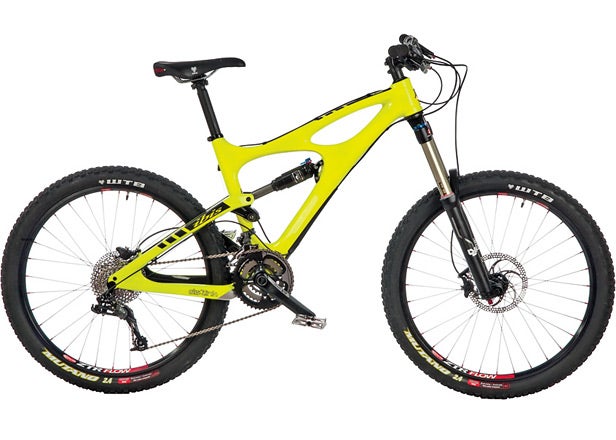
THE SELL: A beefed-up version of their award-winning Mojo SL.
THE TEST: The Mojo HD uses the same tried-and-true DWLink rear-suspension system as the SL, but Ibis surrounded it with heavier-duty components: the burly 6.5-inch Fox Talas 36 front fork was lauded by several tester as the best in our review, and the rear Maxle through-axle hub combined for blade-straight tracking on the gnarliest terrain we could find. The Crank Brothers Iodine wheels (not shown) are as tough as they are sexy, though we felt the bike’s built-inÔÇöand already plenty stiffÔÇöpedaling platform made the ProPedal function on the rear shock redundant.
THE VERDICT: Our favorite longer-travel bike this year. 28.7 lbs;
CLIMBING: 4.4
DESCENDING: 4.5
Cannondale Jekyll Ultimate
$8,000
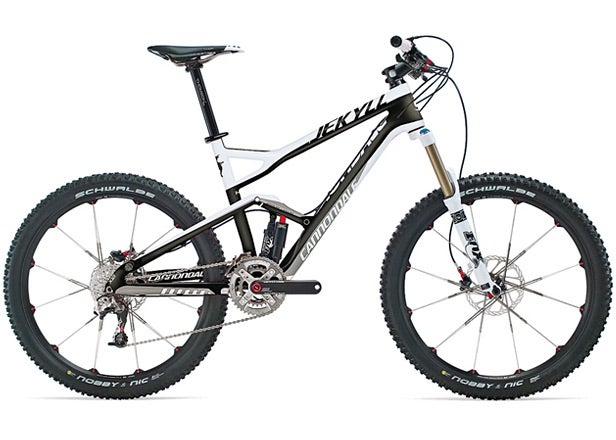
THE SELL: Two-in-one superbike.
THE TEST: Flip the handlebar switch to Elevate mode and the bottom-bracket height increases, the damping stiffens, and you’re suddenly hammering on a bike made for pedaling hard. Switch to Flow mode and the seat and head-tube angles go slack, the sag increases, and you’ve got a gravity sled. The brains of the system lie in the three-chamber Franken-shock, which allows you to toggle between three- and six-inch travel settings. And it works really well: “Wow! Pedal up, jump off, ride downÔÇöI finally need only one bike,” mused one reviewer.
THE VERDICT: It’s no gimmick. The (impressively light) Jekyll performs equally well in both modes. 26 lbs;
CLIMBING: 4.2
DESCENDING: 4.3
BEHIND THE TEST: Road and mountain bikes were tested in Tucson, Arizona; special thanks to the Arizona Inn and Fairwheel Bikes in Tucson and the Broken Spoke in Santa Fe.
